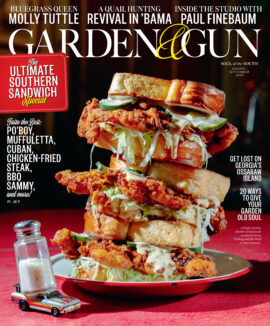“When thinking about their ancestors,” ponders the narrator of Jim Davidson’s 2000 novel, Mine Work, “everybody hopes, if not assumes, that a hero lurks back in there someplace.”
Grace Elizabeth Hale didn’t need to hope or assume; she knew. Her grandfather Oury Berry had served as sheriff of rural Jefferson Davis County in the Piney Woods of Mississippi. One summer evening in 1947, family legend went, he fended off a mob gathered to lynch a Black prisoner accused of raping a white woman. “I’ve known most of you all my life, and I sure am going to hate to have to shoot you,” he upbraided them, like a proto–Atticus Finch, “but no one is taking a man out of my jail.” That the suspect died the next day, shot during an escape attempt, was a tragic postscript. The crucial story, for Hale, was the beloved “bear of a man” she called Pa who’d taken a stand: “He was a hero.”
Except he wasn’t.

Hale grew up to become an esteemed historian who, inspired by her late grandfather’s example, fixed her scholarly lens on lynching. But when she finally trained that lens on the one that family legend held he’d prevented, the story crumbled like cornbread. In the Pines: A Lynching, a Lie, a Reckoning is Hale’s unsparing and often painful account of piecing together what actually happened that summer evening—instead of saving Versie Johnson, a thirty-one-year-old farm worker, from the mob, Sheriff Berry executed Johnson himself, in view of many of them—and what this terrible, hard-won truth means to her, her family, Johnson’s family, and a nation evermore struggling with how to reconcile the ugly facets of its past.
“When Oury Berry and Versie Johnson confronted each other in a field at the Lipsey farm just outside Prentiss,” Hale writes, “what happened next was not only about them…It was about the questions at the heart of the nation: Who exactly gets to have life and liberty, much less happiness? Who gets to be a full American?”
Hale tackles these questions head-on, mustering the implacable force of historical fact. But she also does not shy from a more intimate problem: how to square her Pa—the gentle grandfather who taught her how to clean catfish and enjoy hot sauce—with the Sheriff Berry who shot and killed a captive suspect and lied to cover it up. She had cherished listening to his stories of bygone days as they drove back roads, tales that “transformed the buggy pastures and swampy woods of Jefferson Davis County into a dense and magical landscape.” That was another lesson of his: “He taught me that if I kept my mind open to the traces of the past and learned to tell a good story, I could bring to life the history that was everywhere around us. And he was right. I wonder what he would make of this irony.”
The Mississippi filmmaker and journalist Ellen Ann Fentress is also consumed with what she calls “the weight of history,” her state’s and her own. In The Steps We Take: A Memoir of Southern Reckoning, Fentress scrutinizes in a similarly unsparing fashion the choices she made, and those made for her, as a girl in the Delta, and as a wife, mother, and volunteer in Jackson.
Fentress is a raconteur—sly, witty, with a prose style that’s almost always fizzing. (“Home remodeling is like finding the love of your life,” goes one line. “If it happens to you all the time, something is wrong.”) But her earnest and penetrating examinations of race give this book its heft and urgency. She devotes one chapter to reconsidering, sometimes gingerly, her relationship with the Black housekeeper she employed for two decades. In others she grapples with how her education at an all-white “segregation academy” affected her. “The thinking bred in such a school…lingers inside the head still, even if switched on silent,” she concludes.
Four years ago, Fentress launched the Admissions Project, a digital forum for Southerners to explore the ways race shaped their own educations. “The touchiest part about bringing up the academy past for alums,” she writes, “is that it was our parents who sent us there. You can’t examine the past very long before they materialize in the line of vision.” But what you can’t allow them to do, as both Fentress and Hale make clear, is to cloud that vision. “The true way to address ancestry,” Fentress writes, “is for the living to do their part to make things right, or at least move toward it.”









